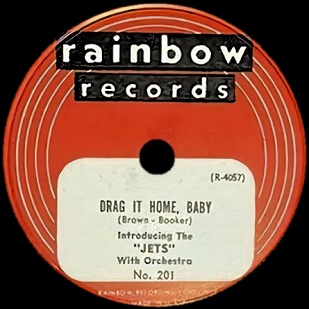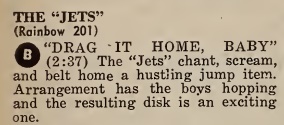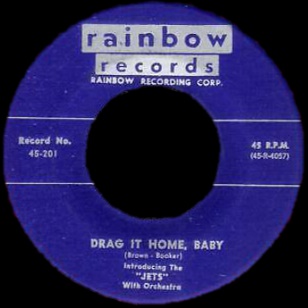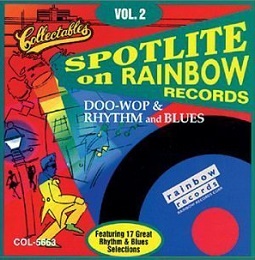The Jets: “Drag It Home, Baby”
30 Tuesday Jan 2024
Written by Sampson
Tags
No tags :(
RAINBOW 201; DECEMBER 1952

There are many words for it, most of which seem to start with the letter A for some reason.
Adapting. Adjusting. Audibling.
But it’s not certainly something that a young group in the recording studio for the very first time anticipated having to do… replace their intended lead singer on the fly for a song.
Yet that’s what they do here and to our surprise the results aren’t bad, so give them credit for (take your pick) Acclimating… Altering… Amending…
The list goes on.
I Know You Need Mine Too
On the surface there’s a lot of good signs to make note of for the first single of The Jets career… and the last for that matter before changing labels and their name.
Both sides featured their own compositions. They also showed they understood the importance of diversity as one half was a ballad while this side was uptempo… and to that end each side was to feature a different lead singer.
You couldn’t draw up a better game plan than that.
Except for one thing… the guy who was supposed to sing Drag It Home, Baby became unavailable to do so after excessive practice made him hoarse.
Considering the group traveled from Washington D.C. to New York for their session and, let’s face it, probably were not being put up at a five star hotel by Rainbow Records who had all of 14 dollars and 83 cents in their bank account, so it was doubtful they’d get to extend their stay another couple of days until Walter Taylor’s voice recovered.

So because they were on the clock they did the only thing they could do, hand the ball to somebody else and hoped he could do the job. The problem was that Charles Booker, though he wrote the song, was their guitarist, not really a regular vocalist for the group. But he obviously COULD sing and does so well enough here not to cause any problems.
How that will effect the rest of the balance on the record however remains to be seen.
Stop That Train In The Middle Of The Track
The good here definitely outweighs the not-so-good, so let’s start with the positives.
First off the record has a boisterous feel to it starting off with a few group shouts and a tinkly piano before jumping into the fray with Charles Booker’s throaty baritone showing a good rhythmic sense with his declarative vocals. The others are displaying enough enthusiasm in their simple parts to suffice while the instrumental backing, particularly the drums and sax, are adding to the gung-ho spirit of the vocals so that it all comes together rather nicely.
It has a compelling sound in other words… maybe not the sound of a surefire hit, but close enough to one to keep your interest up.
As for what they’re singing about, here’s where things are a little conflicted as they try inject frustration into what is ostensibly a love song, or at least a song about desire, as Booker is imploring his girlfriend who is either leaving him for good or just wandering with her affections to come back to him.

Understandable, but somehow I’m not sure that telling her to Drag It Home, Baby is the best way to go about it. Though it’s an interesting choice of words to be sure, as rarely do you see these things phrased quite that way, the word “drag” inadvertently gives off the impression that she’s somewhat slovenly in the way in which she’s comporting herself, which hardly makes it likely she’ll respond positively to his request/demand.
Because we won’t get to hear her respond, nor do we get a more thorough explanation as to where she ran off to, or why, or what she’s been doing since they’ve been apart, the story that might’ve been colorfully fleshed out and justified the “dragging home” reference is left on the table, much to the song’s detriment. It winds up being just a unique saying rather than actually saying something interesting.
Still, the basic concept is fine and it sings well even if the lyrics are pretty basic. With a song like this though, one so charged up and aggressive in its demeanor, it still needs something more to really make it sparkle. Either a great sax solo, a change-of-pace in the bridge, or just a dynamic showcase for the backing singers to give it a different feel as it goes on.
That’s where it doesn’t fully take advantage of its potential. Though we get some nice stop-time vocal interludes, there’s no instrumental break to be found. Instead there’s an undisciplined vocal break that features Booker sputtering around and the other shouting behind him like they were at a boxing match with money on opposing fighters in the midst of a slugfest. The sax player almost seems confused, as if he knows he should be taking a solo but there’s no room for him to do so, and as a result he adds a few honks but nothing to qualify as a suitable transition.
Because of this decision the record sort of collapses on itself rather than builds to a suitable climax. Forget about the fact that it doesn’t make much sense thematically – does their enthusiasm indicate she returned even though they keep crying out Drag it Home, Baby as if she’s still gone? – but simply the fact that it clearly doesn’t know what to do to wrap the record up leaves you with a more ambiguous reaction than if you’d turned it off midway through when it was hitting its peak.
It’s still a good record, particularly as a B-side for a new group with a different lead singer pressed into service, but it’s sadly not all it could’ve been with just a little more imagination.

All You Have To Do
This is where The Jets story ends… but like the record itself it’s also where the ending makes little sense.
On one hand they were going to be forced to re-group anyway after their usual lead Buck Mason was drafted in the weeks following its release, but considering they’d already used two different lead singers on their first two sides – with a third having to be shelved for this due to his strained vocal chords – it wasn’t as if they couldn’t easily cope with another change.
What they couldn’t cope with apparently was Rainbow Records ineptitude, as the label either failed to sign them to a contract – choosing instead to merely pay them for the one session with no further obligation on either part – or else the company simply dropped the group thinking they weren’t worth the time.
Looking at the scant prospects for long term success they currently had on their roster, this decision is inexplicable… well, not if you understand the lack of intelligence required for running a record label.
It’s not as if The Jets, or as they were later known as The Bachelors and The Links, ever scored a hit and so if their barren commercial results are your only measure of their value, then maybe you think Rainbow Records made the right decision when Drag It Home, Baby joined the ballad top side in the rock market’s discard pile.

But for labels of that size, what matters just as much is potential and it’s clear this group had it… at least enough of it to keep them on board long enough to release a handful of singles over the next year or so, hoping that one would break through and thus not only fill their coffers, but also to serve as an advertisement for other hopeful acts unable to get the time of day from the likes of Atlantic or Jubilee or Apollo Records around town.
That’s how you build a roster, that’s how you keep yourself in the game long enough to pull out a surprising hit or two along the way, that’s how you claw your way up the independent record label ladder. If nothing else that’s at least how you carve out a place for yourself, even if it is as a minor league outlet for a certain brand of rock ‘n’ roll made up of kids just getting their start, fleshed out by a few discards of bigger companies after those acts had a commercial downturn.
But this… just picking up and getting rid of an act with genuine potential in the blink of an eye… was just stupid. Why even bother to run a record company if you don’t want artists who can make perfectly good records, even when under duress?
SPONTANEOUS LUNACY VERDICT:

(Visit the Artist page of The Jets for the complete archive of their records reviewed to date)
